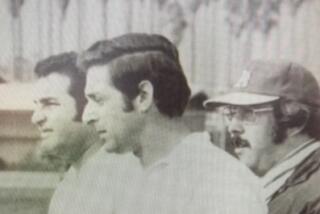AN APPRECIATION : Billy Eckstine’s Career a Glorious Roller-Coaster
- Share via
The story of Billy Eckstine, who died Monday in Pittsburgh, was a tale of two talents--gifts that he could never quite reconcile.
First and foremost was Eckstine the singer. His suave and sensuous sounds came to national attention in 1939 when he joined the big band of pianist Earl (Fatha) Hines. Those were the first great days, with hit after hit, mostly ballads: “I’m Falling for You,” “Skylark,” “Somehow”--but occasionally a blues with a more jazz-oriented personality: “Jelly Jelly,” “Stormy Monday Blues.”
Second there was Eckstine the musician. During his four years with Hines he had learned to play passable trumpet. By now he seemed ready to go out on his own, but the businessmen who controlled the music world in those days were nervous. Changing the spelling from Eckstein to Eckstine, they felt, wasn’t quite enough; it still sounded “too Jewish,” so at one point he even appeared in a 52nd Street club billed as “Billy X-Tine.”
Less than a year after leaving Hines he decided to form his own band, using many of the musicians who had been his colleagues in the Hines ensemble. He began playing valve trombone, surrounded by a virtual who’s-who of the bebop era--Dizzy Gillespie, Miles Davis, Gene Ammons, Dexter Gordon and vocalist Sarah Vaughan (also ex-Hines). This was bebop heaven, a band years ahead of its time.
There was another problem: in the 1940s the music-businessmen felt that a black singer with appeal to both black and white female audiences could create various racially based problems. But those fears were never realized. Eckstine deserves credit for helping to break down those barriers.
Eckstine’s singer/musician conflict came to a head in the mid-1940s. Those who came to hear him croon his way through “A Cottage for Sale” and “I’m in the Mood for Love” became restless sitting through instrumental numbers waiting for “Mr. B” to sing. By the same token, die-hard jazz fans found it tiresome to wade through the vocals waiting to hear Charlie Parker, Budd Johnson and the other bop giants.
Eckstine struggled to keep the band together, but in 1947 gave it up, and for the rest of his life made commercial vocal sessions, many for MGM, slowly lapsing into comparative obscurity during the ‘60s and ‘70s.
His career was a roller-coaster ride, but nobody who ever heard that unprecedented orchestral sound, or that burnished baritone in its prime, will deny that his glory years were glorious indeed.
More to Read
The biggest entertainment stories
Get our big stories about Hollywood, film, television, music, arts, culture and more right in your inbox as soon as they publish.
You may occasionally receive promotional content from the Los Angeles Times.










